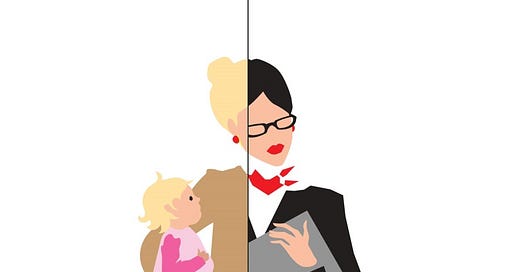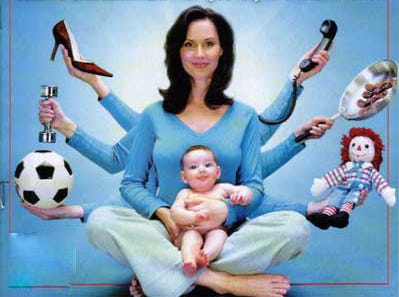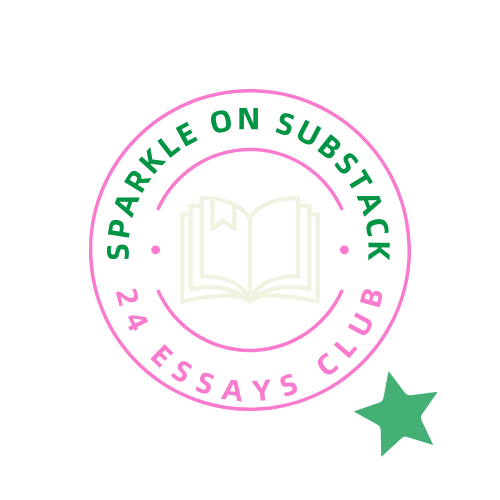Perfect Madness: Motherhood as the Antidote for Perfectionism?
About perfectionism in motherhood, why do we struggle and how we can overcome it with self-compassion, values, and good-enoughness.
This is a free newsletter about perinatal mental health, motherhood, and matrescence authored by a BABCP Accredited CBT therapist. Sign up now to stay in the loop!
Perfectionism is like that overbearing guest at a party who never seems to leave – always lingering in the background, whispering criticisms and fuelling self-doubt. It's the constant pressure to do it all, be it all, and have it all, leaving us feeling perpetually inadequate and exhausted.
Perfect motherood according to social media. Photo from Harper Baazar.
But here's the thing: motherhood has a way of flipping the script on perfectionism, offering a powerful antidote that can transform our relationship with ourselves and the world around us.
Understanding Perfectionism
Perfectionism is like a demanding, critical inner voice that constantly whispers, "You're not good enough". It's the unrelenting pressure to meet impossibly high standards and the fear of failure that looms over every endeavour. From meticulously planning every detail of our lives to obsessively striving for flawlessness in our work, perfectionism can infiltrate every corner of our existence.
In the world of cognitive-behavioural therapy (CBT), perfectionism is often conceptualised as a cognitive distortion, a skewed way of thinking that leads to distress and dysfunction. It's not about having high standards or striving for excellence, which can be positive traits when balanced with self-compassion and flexibility. Rather, it's about the fixed belief that anything less than perfection is unacceptable, leading to chronic dissatisfaction and anxiety.
For many perfectionists, myself included, the quest for perfection is a never-ending battle. We set impossibly high standards for ourselves, constantly seeking external validation and fearing judgment or rejection if we fall short. This mindset can take a toll on our mental and emotional well-being, leading to stress, burnout, and even depression (because if your mind does not stop, your body will make it).
Photo from: Totally Teen Mum
But here's the kicker: perfectionism is a mirage, an illusion that promises fulfilment but delivers only misery. The more we chase perfection, the further it seems to slip away, leaving us feeling inadequate and exhausted. It's a vicious cycle that traps us in a perpetual state of striving, never allowing us to fully enjoy the present moment or appreciate ourselves, neither our accomplishments.
Why High Achieving Women Struggle More Once Having a Baby?
So why do we fall into the perfectionism trap? Well, there are many factors at play, but one common thread is the fear of failure. As high-achieving women, we've been conditioned to equate success with worthiness, to believe that our value as individuals is tied to our achievements. This pressure to succeed can drive us to set unrealistically high standards for ourselves, fearing that anything less than perfection will result in failure and judgment from others.
In exploring the topic, I reached out to some of my fellow Substackers on Notes, and their responses were intriguing:
reported: “I prepared for birth and motherhood as if I was preparing for an exam - just as I’d been taught at school. I’d been taught that if I studied hard enough, I could get an A* and therefore feel worthy, accepted, loved. Very quickly I realised how my education and upbringing (and indeed, how I’d been trained to excel in a capitalist partriarchal soceity) had left me totally unequipped for motherhood. What I actually needed, and what I had to learn (and am still learning) is that surviving - and if it’s possible in our modern culture! - thriving in motherhood requires trust, surrender and letting go of control. It also needs self-trust and intuition which I think most of us, myself included, were taught to ignore an abandon. So finding that again has been really hard“. responded: “At the very beginning, I was so depressed and overwhelmed, and my whole identity completely fell to pieces! Without any confidence in my own intuition, I was obsessed with doing everything “right” according to whatever external standard I could find. But the problem is, there are so many contradictory parenting philosophies, each of which insists it is the only right answer. I was glued to my phone, consuming whatever parenting content I could, and my views careened around based on the attitudes of whatever parenting expert I had encountered most recently“. wrote: “I definitely started off with higher expectations than I have now and with my first son I felt there was a “right” way to do things, and I tried to do that and when I didn’t succeed, i,e something like breastfeeding or putting a baby in our bed when he wouldn’t sleep, I felt like I had failed. With the second baby we shifted into survival mode to be honest and all expectations went out of the window. Anything goes now, to be honest and it is clearer to me now that there is no right or wrong way to parent, just whatever works for your family.Also I have thrown away all the parenting books. 🙌🏻“
noted: “The only reason I did not graduate college summa cum laude is because of three pesky classes: Labor Economics, Business Accounting, and Operations Management. All of these ironically relevant to motherhood! I am an extremely high achiever and always struggled with control. I think becoming a mother and given the circumstances under which I became a mother - oldest a 29 weeker, second diagnosed at birth with Down syndrome, and the third an IUD baby - was like the higher power giving me life lessons in how to give up and let go of that illusion of control. It is still a struggle to dismantle my high expectations but I am a work in progress. I am now trying to balance spending quality time as a family and finding time for myself while managing all the demands of having a young family. In a way I kind of Marie-Kondo it - how important is it that this gets done, what is the emotional or physical (or both) benefit, and the most important question - does it disrupt anyone’s sleep?“.
But perfectionism isn't just about the fear of failure; it's also about control. Perfectionists like to be in control of their lives, meticulously planning every detail to avoid uncertainty or discomfort. However, motherhood, with its inherent unpredictability and chaos, challenges our need for control in profound ways. Suddenly, we're faced with a tiny, helpless human who refuses to adhere to our carefully crafted schedules or follow our meticulously laid-out plans. And try as we might, we quickly learn that we can't control everything – and that's okay. I still remember how difficult I found breastfeeding 'on demand,' or how challenging it was to put down my firstborn, who felt like he was strapped to me by magical Velcro.
In addition to control, many high-achieving women struggle with perfectionism because they've always received recognition and validation from their careers. Whether it's praise from colleagues, promotions, or awards, our professional accomplishments have been a source of pride and identity for many of us. But when we become mothers, we're suddenly thrust into a role where our achievements are less tangible, where success is measured in sleepless nights and dirty nappies rather than promotions or exceeded targets. This shift can be jarring, leaving us feeling unmoored and unsure of our identity outside our careers and achievements.
Photo from Working Mom Manila
Another challenge for perfectionistic mothers can be the lack of family support. Unlike some of our less perfectionistic counterparts who may have robust support networks in place, we may find ourselves shouldering the burden of motherhood largely on our own. Whether it's due to geographical distance, strained relationships, inability of others to meet our high standards or simply in the past not prioritising relationships, the lack of support can exacerbate feelings of overwhelm and isolation, making it even harder to let go of perfectionism.
Finally, perfectionistic mothers are more likely to feel a loss of identity when they're out of work or hobbies due to motherhood. Many of us have poured our heart and soul into our careers or personal interests, finding fulfilment and validation in our professional or creative pursuits. But when we become mothers, those pursuits often take a backseat to the demands of caregiving, leaving us feeling adrift and disconnected from our former selves. And as much as we love our children, we can't help but mourn the loss of our pre-motherhood identities, wondering if we'll ever find our way back to the passions and interests that once defined us.
What Helped Me to Overcome Perfectionism
Now that we've explored the challenges of perfectionism in motherhood, let's talk about how we can overcome it and embrace imperfection. I'll be honest – it's not easy, and it's definitely a work in progress. But through my own journey (both, thought self-reflection and my own therapy), I've discovered a few strategies that have helped me find greater peace and joy in motherhood.
First and foremost, it's all about self-compassion. Instead of beating ourselves up for our perceived shortcomings, we need to treat ourselves with the same kindness and understanding that we would offer to a friend. That means letting go of unrealistic expectations and embracing our flaws and imperfections as part of what makes us human. I still remember a therapy session where I shared my self-critical thoughts, and my therapist asked me if I would say those things to my son. 'Of course not,' I replied. 'So why do you say them to yourself?' she asked. That question hit me like a ton of bricks.
Interestingly,
also mentioned self-compassion as a component that helped her to overcome difficulties:“What helped me was learning to practice, and practicing on a daily basis, self-compassion. Acknowledging that this is how it is, it’s really hard, saying to myself: I’m here, I love you. And also having open-hearted, vulnerable conversations with other mums who feel like me, parent like me and ‘get’ me and what I’ve experienced”.
There has been a lot written within this lovely space about self-compassion, so please feel free to read one (or all!) of the following pieces:
Kathryn Barbash, PsyD amazing post about easy ways to implement self-compassion while being a busy parent.
wrote a piece about self-compassion making us stronger, not weaker. loving-kindness meditation (“metta”) is exactly what the mum’s soul needs.
Next, we need to learn to let go of perfectionistic standards and accept that "good enough" is truly enough. That doesn't mean settling for mediocrity or abandoning our ambitions; it simply means recognizing that perfection is an unattainable ideal and that striving for it only leads to frustration and disappointment. In the past, I wrote about how to beat dichotomous thinking and why “good enough parenting” is sufficient. Please feel free to familiarise yourself with those articles for more insights.
Finally, we need to shift our focus from goals to values. Instead of chasing after external markers of success, we need to ask ourselves what truly matters to us and align our actions with those values. For me, that means prioritizing quality time with my family, nurturing my relationships, and taking care of my mental and emotional well-being – even if it means letting go of some of my more perfectionistic tendencies. If you are wondering what your values are, I would like to mention the Bull’s Eye framework, which helps to map out and work towards your values.

Perfectionism Does Not Have to Be All Bad
Before we wrap up, I want to leave you with one final thought: perfectionism isn't inherently bad. In fact, it can be a powerful driving force that motivates us to achieve our goals and reach our full potential. The key is learning how to harness that perfectionistic energy in a way that aligns with our values and promotes our well-being.
For me, that means recognising that I am naturally "perfectionistic" – and that's okay. But it also means learning how to manage that perfectionism and make sure that it's serving me rather than hindering me. It means setting high standards for myself but also being flexible and forgiving when things don't go according to plan. It means learning from my mistakes rather than beating myself up over them. And most importantly, it means recognising that my worth is not tied to my achievements – that I am enough, exactly as I am. Or, as
said, it is about rebuilding your own intuition:“Gradually I got to a place where I could consider expert advice without always feeling like a failure, and now I can say that I have reached a healthy place of acceptance that I am a “good-enough” mom”.
So yes, motherhood may challenge our perfectionistic tendencies, but it also has the power to transform them into something beautiful. It's a journey of self-discovery, self-acceptance, and self-love – and it's a journey that I'm here to share with you.
As we navigate the challenges of perfectionism and motherhood together, I invite you to share your experiences:
Have you struggled with perfectionism as a mother?
How have you learned to embrace imperfection and find joy in the messy moments of parenthood?
Your stories and insights are invaluable, and I'd love to hear from you.
And if you're looking for more content on perinatal mental health, motherhood, and matrescence, be sure to subscribe to Unscrewing Motherhood. Join our community of mums as we explore the ups and downs of parenthood, share strategies for self-care, and support each other on this beautiful journey.
This is the fourth post of the Substack challenge Sparkle on Substack 24 Essay Club run by Claire Venus from Sparkle on Substack. Please visit the linked page above to join in if you wish!













Dear Aleks, there is so much to unpack here. What a great article! I have been thinking a lot about motherhood, especially this weekend, and how our roles as “mothers” have changed over time. I don’t think my mother read a single parenting book, nor given much thought to how well she was raising us. My brother and I were often left alone and expected to cook our own food and bring home the perfect grades. This was one extreme. The other extreme is how today we have seem to have turned our kids into our most important project, along with the project of work, a household and healthy, fit bodies. It’s just not sustainable. We put so much pressure on ourselves. I think you are right to point out that self compassion is the first step. When I had a cancer scare I practiced a lot of meditation and I had a vision in which I saw my adult self, pick up and carry my toddler self. I sobbed and sobbed. It was a clear message from my body that I needed to see myself as my own child and take care of myself. So I think this is the greatest advice: treat yourself as you would treat your children.
Oh yes, I know the story of perfectionism well! Values and self-compassion have been so helpful to me in my imperfect motherhood. Another beautiful piece Aleks!